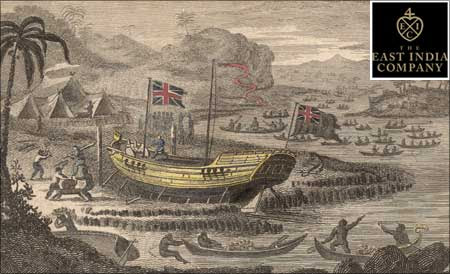
In 1600, a few London businessmen received a royal charter from Queen Elizabeth to begin a small-scale commercial venture known as the Governor and Company of Merchants of London Trading into the East Indies. After initial struggles, they gradually established factories and trading points along India’s coast. By the late 1700s, their small trading business, later known as the East Indian Company or EIC, accounted for half of the world’s trade in basic commodities such as cotton, silk, indigo dye, salt and opium. The Company eventually monopolized the spice trade and ruled large parts of India. Because of foreign competitors and its control over rather expansive territories, the EIC created its own private army, establishing military authority over India and other nearby regions.
To historians, the East India Company is an anomaly in political governance. While the Queen of Great Britain originally granted the company license to operate in India, the EIC had garnered so much resource that it became an imperial power in its own right. The British government had little control over the company because:
- The EIC became a joint-stock company in 1657, which meant that individuals, mostly wealthy aristocrats, purchased ownership of the company. The British government had no shares in the company and therefore no ownership.
- The EIC had legal jurisdiction over its own factories and trading posts.
- The EIC created its own military and navy, allowing it to administrate its affairs in India.
By the end of its existence in 1873, the East India Company had established trade as far as the Middle East and throughout Asia, owning territory larger than the entire British Empire. Eventually, the British government passed legislation that allowed it to regulate the Company’s actions, effectively neutralizing its monopoly. At its strongest moments, the East India Company existed as an organization with enough power to establish its own colonies while answering to no other governing bodies. Edmund Burke, a member of the British parliament and political theorist, wrote, “the constitution of the Company began in commerce and ended in empire; and where powers of peace and war are given, it wants but time and circumstance to make this supersede every other” (The Impeachment of Warren Hastings, 1788).